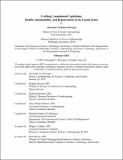Crafting Cannabinoid Capitalism: Health, Sustainability, and Regeneration in the United States
Author(s)
Rewegan, Alexander Nicholas
DownloadThesis PDF (6.738Mb)
Advisor
Paxson, Heather
Terms of use
Metadata
Show full item recordAbstract
This dissertation offers a critical exploration of cannabis legalization through an ethnographic study of small-scale "legacy" cannabis farmers in Humboldt County, California, as they navigate a complex transition from prohibition to commodity capitalism. I focus on their collective efforts to envision and practice “regenerative agriculture" as a response to both the historical injustices of prohibition and the compounding challenges of climate change. Drawing on history, STS, and the anthropology of food, agriculture, and medicine, I show how the logics of the war on drugs— rooted in carcerality, settler colonialism, and plantation agriculture—structurally and affectively persist in the socalled “post-prohibition” era, frustrating farmers’ efforts to resist monopolization and dispossession. Throughout, I attend to how the pervasive notions of “health,” “sustainability,” and “regeneration” are actively negotiated, modified, and put to use as material and symbolic tools in crafting medicinal, agricultural, and ecological futures. The Introduction weaves a tapestry of themes, histories, and theories that set the stage for the main ethnography. Through a blend of personal narrative, ethnographic vignette, and critical theory, it works to situate cannabis as a fluid and multifaceted object, highlighting people’s ambivalent hopes and cynicisms towards legalization. From alternative farming to molecularized biocapital, it articulates the intersecting influences of climate change, racial capitalism, and Indigenous sovereignties in ongoing projects to commercialize and legalize cannabis in a globally connected United States. Chapter One outlines my research methods and provides a social and narrative history of the study’s fieldsite, grappling with the anthropological complexities and complicities of studying working landscapes in a settler colonial “frontier ecology.” Chapter Two unpacks the shifting and embodied subjectivities of both farmers and workers as they reconfigure themselves in service of licensed production, highlighting sociocultural tensions and contradictions, the structural challenges of regenerative gardening, and the labor dynamics that shape these processes. Chapter Three analyzes how the inchoate and social nature of cannabis regulation both hinders and supports regenerative farming, emphasizing financial strain, and the ever-pervasive role that surveillance technologies are playing in cannabis governance. Chapter Four shifts to the harvest season, exploring farmers’ collective efforts to market their products through the concept of “drug terroir,” unpacking how their values and practices entangled with regional efforts to address wildfires and remediate leftover drug war infrastructures. Chapter Five moves off the farm and onto the topic of consumption as it historicizes the growing scientific literature about cannabis and pregnancy, demonstrating how carcerality continues to infiltrate maternal-fetal health science and conceptions of reproduction and health. The dissertation ultimately explores the ways in which American cannabis legalization often regenerates, rather than resolves, the legacies of prohibition and settler colonialism, while at the same time illuminating alternative and promising practices that might challenge these enduring forces.
Date issued
2025-02Department
Massachusetts Institute of Technology. Program in Science, Technology and SocietyPublisher
Massachusetts Institute of Technology